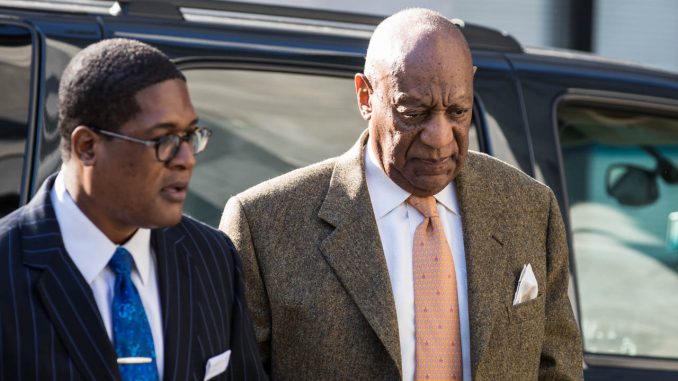
The jurors in Bill Cosby’s sexual assault retrial were seen smiling on Monday afternoon after they received good news: the defense rested its case.
The 12 jurors and six alternate jurors have been sequestered since April 8 and will hear closing statements early Tuesday morning. After hearing these statements, Cosby’s fate will be in the hands of the seven men and five women on the jury, two of whom are Black.
A jury panel of the same makeup had the same task in June. But these jurors were unable to make a unanimous decision “beyond a reasonable doubt” that Cosby had committed sexual assault and drugging. After 52 hours of deliberations, the case ended in a mistrial.
Cosby, a former university trustee, is charged with three counts of aggravated indecent assault for allegedly drugging and sexually assaulting former Temple employee Andrea Constand in his Montgomery County home in January 2004. If convicted, the 80-year-old comedian faces up to 10 years in prison for each count and will likely spend the rest of his life there.
Although Cosby’s charges remained the same, his two trials were vastly different. The jury panel in the retrial learned how much money Constand, the former director of operations for women’s basketball, was paid in a 2005 civil suit against Cosby — nearly $3.4 million. Jurors also heard testimony from five of more than 60 Cosby accusers to show a theme of “prior bad acts.” The previous jury only heard one woman’s testimony.
This retrial also comes on the heels of the national #MeToo movement, which took over headlines and opened up a dialogue about sexual misconduct from powerful men in the entertainment industry.
Before they were chosen, the jurors testified that they could each serve impartially despite the national movement, media attention and prior knowledge of the allegations against Cosby.
Cosby’s defense rested its case early afternoon on Monday, with its last witnesses including an airline pilot and an assistant from Cosby’s former talent agency to testify about his travel during January 2004. This is the time frame when Constand alleges she was drugged and sexually assaulted by the former trustee.
Roslyn Yarbrough, an interior designer who formerly worked as an assistant to Cosby’s agent at the William Morris Agency, testified on Monday about the travel itineraries she would create for the comedian during January 2004. These itineraries and pay slips outline Cosby’s trips to Florida, Arizona, Kentucky, Michigan, Iowa and provinces in Canada. The itineraries do not show Cosby’s whereabouts for each day in January, but show trips during about half of the month.
Yarbrough also testified that Cosby mainly stayed in his New York or Massachusetts homes, and didn’t often stay in his Cheltenham home, where Constand alleges the assault occurred.
“He was there very rarely,” she told jurors.
But the prosecution questioned Yarbrough about whether Cosby could have traveled without logging in his itineraries. It also asserted that there are inconsistencies in a few of the documents.
Douglas Moss, who has been a United Airlines pilot for 40 years and an adviser to attorneys about aviation issues, also testified as an expert witness about pilot practices for Federal Aviation Agency regulations.
He testified that he analyzed the original documents completed by Cosby’s personal pilot and documents that were input into a computer system. He said he did not find any irregularities.
These two witnesses finalized the last argument for the defense: Cosby couldn’t have been home for the 2004 alleged assault.
The defense used the rest of its witnesses to attack the credibility of Constand, including testimony from key witness Margo Jackson, a Boyer College of Music and Dance academic adviser. Jackson testified that Constand told her she could make a profit for accusing a man of sexual assault while working with the women’s basketball team.
Before dismissing the jury, Montgomery County Court of Common Pleas Judge Steven T. O’Neill asked Cosby if he wanted to testify. He declined.
O’Neill denied the defense’s request to use the 2005 deposition of Sheri Williams, one of Constand’s friends, because the prosecution would not be able to cross examine her testimony. Williams did not answer to nine subpoenas the defense sent to her since mid-March.
O’Neill didn’t allow a defense summary witness to take the stand to point to the holes in Cosby’s travel, because he said it would be too opinionated and would be best suited in the closing statement.
O’Neill will allow two of Cosby’s defense attorneys Tom Mesereau and Kathleen Bliss to deliver portions of the closing statement on Tuesday.



Be the first to comment